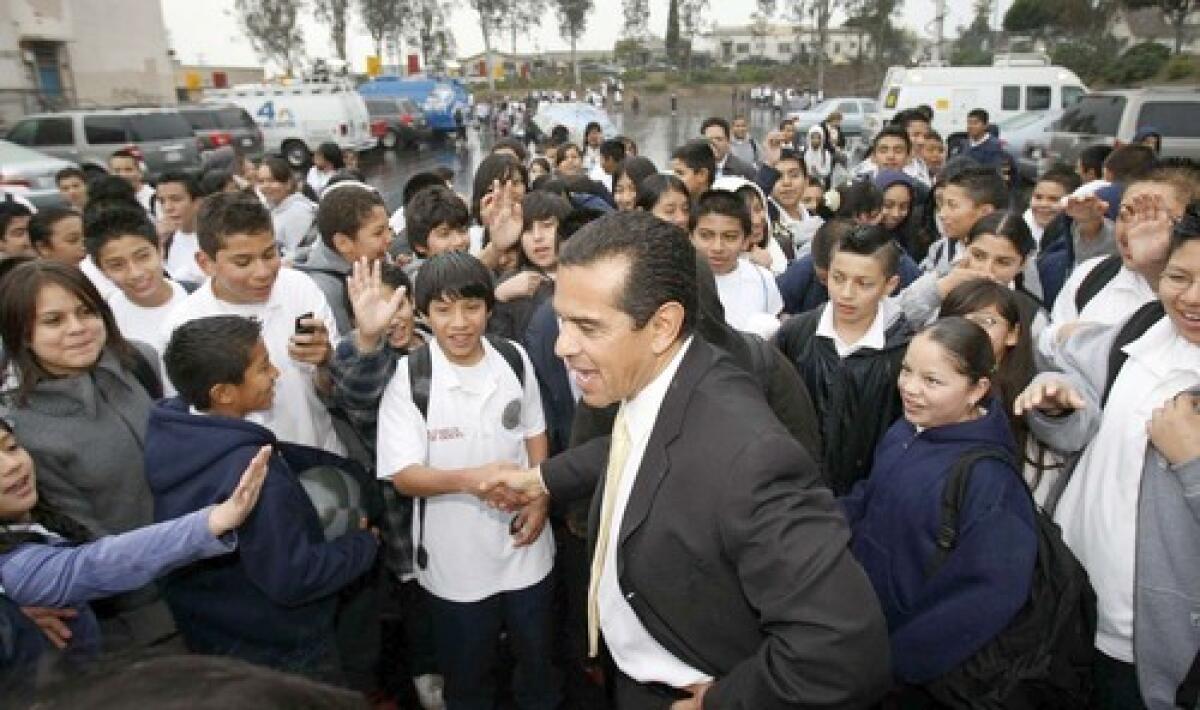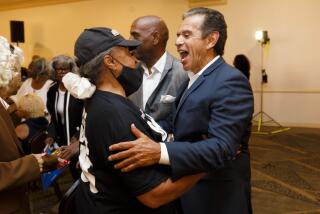Did Villaraigosa’s margin of victory hurt gubernatorial ambitions?

- Share via
Los Angeles Mayor Antonio Villaraigosa handily won his reelection bid. Whether he secured the type of bounce needed to catapult him into a 2010 race for governor is another matter entirely.
With nine little-known challengers running against him, Villaraigosa secured 55.6% of the vote on election night -- a solid win but hardly a blowout. Those numbers were a clear message from voters, said City Controller Laura Chick: They want the mayor to focus more attention on his job.
“It doesn’t take a rocket scientist to analyze the results and figure out that if you’re an incumbent mayor running for your second and last term, and . . . you’re running against unfunded, unknown opponents, 55% is not an overwhelming mandate from the public,” said Chick, who is being forced out by term limits.
The election was a mixed bag for the mayor in other ways. His ally, City Councilman Jack Weiss, was forced into a runoff in the race for city attorney. His push for the solar energy plan known as Measure B stumbled despite a flood of 30-second television commercials that featured the mayor as the sole salesman. And Measure E, a plan to give taxpayer subsidies to businesses, was defeated despite support from Villaraigosa and Police Chief William J. Bratton.
In the campaign’s final days, Villaraigosa had worked to recreate the magic of his 2005 campaign by reenacting his barnstorming bus tour across the city. Yet that event, which took him to such venerable locations as Pink’s Hot Dogs and El Tepeyac, coincided with revelations that the city could face a shortfall of nearly $1 billion in 2010 -- the year a gubernatorial campaign would shift into high gear.
Even Tuesday’s election night party for Villaraigosa was a far cry from the joyous response to his victory four years ago, when thousands of people descended on downtown Los Angeles for an enormous outdoor celebration. As Villaraigosa gave his victory speech Tuesday night, many in the audience talked over him, making it difficult to hear his remarks.
Yet despite this year’s change in mood, Tuesday’s election was hardly a washout for the mayor. He saw another close ally, Councilwoman Wendy Greuel, overwhelmingly win her bid to replace Chick as controller. Voters elected his two favored candidates for the Los Angeles Unified School District board, a situation that gives him six allies out of seven members on the panel that governs the Los Angeles Unified School District.
Furthermore, 46,000 provisional ballots that have yet to be counted could considerably boost Villaraigosa’s standing in the mayor’s race -- and give the solar power proposal the 50% or more yes votes needed to win. Villaraigosa also pointed out that attorney Walter Moore, whom he refused to debate during the campaign, came in a distant second with 26.3% of the vote.
“I celebrate that. But also I acknowledge that people are concerned about the future,” Villaraigosa said at a meeting Wednesday with business leaders in North Hollywood. “They’re concerned about whether or not they are going to keep their job, concerned about the economy and what it means for their families.”
When Villaraigosa soundly defeated incumbent Mayor James K. Hahn four years ago, he secured 59% of the vote. That victory was considered a landslide, particularly since Hahn had spent $6.3 million on his reelection bid.
This time around, Villaraigosa’s campaign has been overshadowed by a sharp economic downturn, which has forced him to openly discuss unpleasant choices that face the city, such as layoffs or early retirement offers to the city’s workers. At the Port of Los Angeles, where the mayor had hoped to emphasize his ambitious environmental cleanup plans, cargo activity dropped 10% in January compared to the previous year.
On Wednesday, Villaraigosa found himself fielding questions about Dist. Atty. Steve Cooley’s decision to file campaign money-laundering charges against two Florida businessmen who had raised contributions for him in the 2005 campaign.
Yet despite his various challenges, Villaraigosa is keeping the door open to a gubernatorial run, promising to be “as forthright and honest as I can be” about a statewide bid.
“If you were in my position and you had an opportunity . . . to be the governor of the state of California when you have the kind of experience I do -- big city mayor, Speaker of the Assembly -- would you just discount it? Of course not. Particularly when the state is in a crisis,” he said.
Villaraigosa’s supporters are more aggressive about his gubernatorial prospects, saying that the mayor has vigorously tackled deeply rooted problems such as public education, crime and air pollution.
“I think he’s the best candidate and I want the best candidate,” said his friend and advisor Maria Elena Durazo, executive secretary-treasurer of the county Federation of Labor, AFL-CIO.
Still, other incumbent mayors had stronger showings over the last 30 years. When then-Mayor Richard Riordan won reelection in 1997, he received 61.5% of the vote in a campaign against then-State Sen. Tom Hayden.
In 1985, then- Mayor Tom Bradley beat back a challenge from then-Council President John Ferraro, winning 68% of the vote. When he narrowly avoided a runoff election four years later, he was viewed as politically weakened.
Villaraigosa’s showing of 55.6% makes it harder for him to position himself as a statewide presence, said Jaime Regalado, executive director of the Edmund G. “Pat” Brown Institute for Public Affairs at Cal State L.A. For an incumbent mayor with ambitions, that figure is “dismal,” he said.
“For Antonio to say the wind is at his back, he needed to pull above 60%, especially against a very weak field,” he said.
david.zahniser
@latimes.com
Times staff writer Michael Finnegan contributed to this report.
More to Read
Sign up for Essential California
The most important California stories and recommendations in your inbox every morning.
You may occasionally receive promotional content from the Los Angeles Times.











